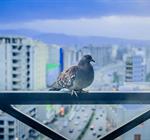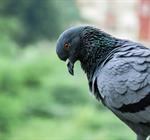
22 Jul 2022 | Apex Environmental Services (UK) Ltd
Guano refers to bird poo, or more precisely, an enormous amount of it. If you’ve spent any time in the UK’s largest cities, you’ll know that guano is a major problem.
Not only is guano an eyesore, it’s also a health and safety hazard. An accumulation of guano can lead to the airborne transmission of bacteria, potentially causing serious illness. When left to accumulate, guano can also become acidic and damage your property.
In this guide, we’ve covered everything you need to know about guano clearance, and why it isn’t always safe to clean it up yourself.
First of all - why do we call bird poo ‘guano’?
The word guano is derived from the Quechuan word “Wuano”, meaning a large accretion of bird waste or bat waste. So, why is bird poo called ‘guano’?
Put simply, we prefer to use the term guano than “bird poo” or “bird droppings” - it just sounds more elegant. Plus, the term ‘guano’ refers to a large accumulation of waste - it’s important to note that when we talk about guano, we’re not just talking about a few bird droppings here and there.
Why guano is bad for your local environment
If you live in an area with lots of guano, you might not be aware of the dangers posed to both your health and your property by its presence. Here are just a few ways the presence of guano can pose a safety risk:
Transmission of bacteria
Like any other waste product, bird droppings contain parasites, pathogens and other harmful bacteria. The problem with bird waste is that nobody is around to clear it up off the pavement or walls right away - this means that guano dries and sticks to concrete surfaces. Dried guano can release microscopic spores that contain harmful bacteria, and these particles are easy to inhale if you come into contact with them.
Guano is known to transmit some of the following bacteria:
- Chlamydia psittaci. Chlamydia psittaci is a flu-like illness that can occur if you inadvertently inhale droplets of contaminated guano.
- Cryptococcus. A fungal disease, Cryptococcus can cause serious complications for the immunocompromised. In 2019, a child in a Scottish hospital fatally contracted Cryptococcus after pigeon guano in the ceiling managed to break through into the walls of the hospital ward.
- Salmonella. Salmonella can be found in bird droppings, and can cause symptoms similar to stomach-flu if contracted.
Food contamination
If lorries, HGVs and delivery drivers are unloading food products onto pavements covered in guano, this poses a significant risk of food contamination. It’s also unsafe for workers to pass through areas contaminated by guano without adequate safety gear and protection.
Mould and other property damage
Aside from the potential for transmitting bacteria and harmful pathogens, guano can also damage your property. This is because guano contains uric acid, a compound with a pH level of 3.5-4. Once guano turns acid, it can easily begin creating rot in walls and roofs. If not treated quickly, this rot can damage the integrity of your property, and even cause leaks.
As some guano also contains fungal bacteria, an accumulation of guano on your roof can also contribute to the development of mould.
Makes your community appear unclean
Another obvious problem with guano is the impact on your local community. With the streets covered in guano, passers-by are unlikely to want to spend time in your area.
This can impact small local businesses: if passers-by are much less likely to contribute to the local economy by eating in restaurants, sitting in cafes or doing their shopping, small businesses might find it difficult to thrive.
Guano isn’t great for local residents either, especially for young families whose children play outside. It’s also unsafe for eldery neighbours, who might be severely affected if they are contaminated with guano-related pathogens.
How to get rid of guano
When it comes to guano clearance, it’s important to hire a qualified pest control team to get rid of it. You shouldn’t try to get rid of guano yourself for the following two reasons:
- You don’t want to expose yourself to potential airborne pathogens. Pest control teams will equip their workers with full protective gear to prevent against the inhalation of any contaminated guano.
- Water and soap won’t do the trick. You might be used to clearing guano off your car doors or windows with some soap and water, but this isn’t enough when dealing with a substantial accumulation of guano. Pest control teams use powerful antibacterial cleaning agents to destroy any harmful bacterias, and use jet-powered hoses to lift all dried guano that has stuck to the pavement or building.
Guano clearance London
If you live or work in any of the UK’s largest cities, you’ll most likely already know that most suffer from a significant pigeon - and guano - problem.
Whether you’re a business owner or live in a property surrounded by guano, it’s essential for the health and safety of your family, employees, and customers to tackle the problem. Letting guano accumulate will only increase the risk of inhaling airborne pathogens.
If you’re looking for guano clearance Bath, our expert team uses a combination of powerful cleaning agents and jet-powered hoses to fully lift off any dried guano, and the process typically takes less than a day to complete.
To make your home and local community safe and clean again, consider professional guano clearance.
FAQs
Are pigeon droppings considered hazardous waste?
Pigeon guano can contain harmful bacterias that can lead to airborne illnesses such as salmonella and cryptococcus. You should avoid dried guano at all costs to minimise your risk of inhaling contaminated droplets.
What is the best way to clean pigeon droppings?
If you’re dealing with a small amount of recent guano (aka guano that has not yet dried), we’d recommend using antibacterial dish soap and a scrubbing brush to get rid of it. Make sure to wear gloves and throw the brush in the bin afterwards. For larger public areas, we’d always recommend using professional guano clearance services.


